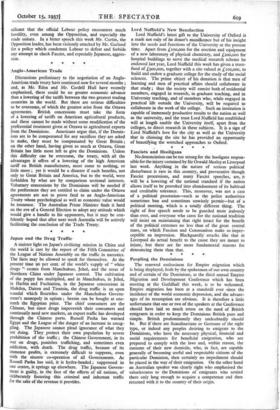Anglo-American Trade Discussions preliminary to the negotiation of an Anglo-
American trade treaty have continued now for several months ; and, as Mr. Eden and Mr. Cordell Hull have recently emphasised, there could be no greater economic advance than a lowering of the tariffs between the two greatest trading countries in the world. But there are serious difficulties to be overcome, of which the greatest arise from the Ottawa agreements. British concessions must take the form of a lowering of tariffs on American agricultural products, and these cannot be made without some modification of the preferential treatment given at Ottawa to agricultural exports from the Dominions. Americans argue that, if the Domin- ions are to be compensated for any sacrifices they are asked fo make, they must be compensated by Great Britain ; on the other hand, having given so much at Ottawa, Great Britain has little more left to give the Dominions. Unless this difficulty can be overcome, the treaty, with all the advantages it offers of a lowering of the high American tariff on British manufactures, must come to nothing, or little more ; yet it would be a disaster if such benefits, not only to Great Britain and America, but to the world, were forbidden by what are by comparison sectional interests. Voluntary concessions by the Dominions will be needed if the preferences they are entitled to claim under the Ottawa agreements are not to prove fatal to an Anglo-American Treaty whose psychological as well as economic value would be immense. The Australian Prime Minister finds it hard on the eve of a General Election to adopt any attitude which would give a handle to his opponents, but it may be con- fidently hoped that after next week Australia will be actively facilitating the conclusion of the Trade Treaty.
* * * *






















































 Previous page
Previous page